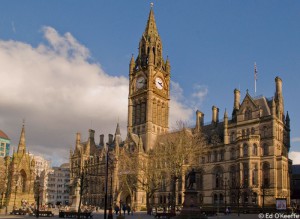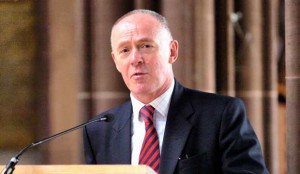What might a mayor mean for Manchester?
Article published: Tuesday, May 1st 2012
This week the people of Manchester will make a decision that will change the face of the city for the foreseeable future. Along with 12 other major UK cities, Manchester will decide whether or not to replace the current council leader with a directly elected mayor through a Mayoral Referendum on Thursday 3 May.
This isn’t the first time Mancunians have been consulted on whether or not to have an elected mayor, in 2009 two thirds of the households that responded rejected the proposal and opted to stay with the current council model.
Despite the gravity of the potential change there is an information drought surrounding the referenda nationally. And it’s not just facts and figures that are missing from the debate, but the lack of any debate at all. A lack of information usually leads to a lack of interest, as demonstrated by the turnout in the Salford mayoral referendum in January, where just 18.1 per cent of the 171,000 electorate voted.
Powers
So, what will a directly elected mayor mean for Manchester? Or, perhaps more importantly, what will it mean not to have one?
To begin with, what powers will a mayor have if a yes vote is passed on Thursday? Don’t be surprised if you don’t know the answer, as the mayors’ actual powers are, in fact, yet to be conclusively decided.
Should new mayors be elected however, they will have a significant role personally in deciding their own powers. According to a government consultation published in November 2011:
“We do not presume to know what is best for each of the cities in terms of the specific powers that should be exercised by individual city mayors. We are thus proposing to look to the cities themselves to come forward with their own proposals. Where a mayor is elected […] we expect that mayor to put to us any proposals he or she has for decentralising services and powers to that city mayor.”
Personality
Pat McDonagh, Branch Secretary of UNISON’s Manchester Local Government branch, warned switching to a directly elected mayor may lead to local politics becoming dominated by personality instead of “substance or the real issues”. He went on to say, “What we’ve got now isn’t perfect, no political arrangements are. But an elected mayor is even worse.”
It is reasonable to expect that new mayors would be likely elected based on personality rather than policy, since based on the information above, they won’t know what powers, and therefore policies, they’re allowed to have.
Add to this increased accountability to the people (i.e. increased public visibility of your decision making) and you’re bound to have personality coming into play. This could turn out to be a positive in cities where you have a cooperative mayor who is willing to work with others to make decisions and truly listen to their electorate. On the other hand, if a power hungry or selectively-deaf individual rises to power their personality could end up legislatively grid-locking the city council with constant proposal rejections and political blocking.
It’s also interesting to note that, so far, ‘personality’ politics has generated an almost exclusively white, male, middle aged and middle class set of new mayors. Of the fourteen existing directly-elected mayors, only two are women and just one, Lutfar Rahman, mayor of Tower Hamlets, London, is not white.
Democratic deficit?
Another key argument for a no vote in the referendum, echoed by UNISON, is that a sizeable chunk of power and decision making will be placed in the hands of one individual. Currently, the full council is theoretically responsible for all decisions it makes, although in practice most of the power is delegated to smaller groups of councillors with overall decisions being made by senior councillors and Sir Richard Leese, the current Council Leader.
Leese, who is highly influential across Greater Manchester through his role in the Association of Greater Manchester Authorities (AGMA), has the most to lose if Manchester decides to vote for an elected mayor. A coalition of the 10 council’s across the county, AGMA’s overall policies are the product of a careful balancing act by the power brokers of the region – an arrangement that could be thrown into disarray by a populist mayor. Not to mention the threat to his personal position if the local Labour party, as happened in Salford to John Merry, booted him out in favour of a new candidate for governing the city.
In a recent Leader’s Blog, Leese commented:
“Democracy needs checks and balances and although the power to scrutinise is important I do think it is insufficient on its own and whatever form of city and Council leadership we have, if a proposal can’t get the support of half the Council then it should fall.”
Leese’s point is supported by a parliamentary note dated April 19 2012, where MPs were informed that “[new] mayors [will] set the budget and formulate significant policy plans but amendment or rejection of the proposals requires a two-thirds majority of the council”.
“Cabinet of Mayors”
In support of the yes campaign, Chorlton Liberal Democrat Councillor Victor Chamberlain has thrown his support behind the proposal for directly-elected mayors, along with the rest of his party:

Liberal Democrat Councillor for Chorlton, Victor Chamberlain, supports a yes vote in the referendum.
“Salford and Liverpool have already backed an elected mayor and next Thursday will go to the polls to elect a new Mayor […] they will have someone championing their cities on a national and international stage. This could seriously erode Manchester’s standing unless we too have someone championing Manchester on the same stages.
“The Prime Minister has said he will create a ‘mayors cabinet’ to bring our cities right to the heart of Government; Manchester cannot afford to be left out in the cold; particularly in the current economic climate.”
This refers to the recent government announcement of a ‘Cabinet of Mayors’, a group made up of newly directly elected mayors from major cities (and actually, Salford won’t be allowed in under the current proposal) that will consult with the Prime Minister at least twice a year.
According to cities minister Greg Clark, the mayoral cabinet is an opportunity to “represent their communities at the heart of government by coming together, sharing innovations and building relationships.” The former leader of Newcastle City Council, Lord Beecham, has called a seat in this new cabinet “a bribe” in favour of a yes vote.
The possibility of Manchester being left out of this Cabinet of Mayors is arguably the key reason Chamberlain and many others support the yes vote.
Political element
There is also the political element of these referenda to consider. Labour has near unbeatable majorities on the councils of eleven of the twelve cities proposed for switching to the directly-elected mayoral system. Not only that, but all bar one – Bristol, which has a Liberal Democrat council – are in the traditional Labour ex-industrial heartland of the Midlands and North of England. Not one city from the South East or any other traditional Conservative stronghold has been selected as a target for radical change of its leadership structure and the reason the Conservatives and Lib Dems support the yes vote for directly-elected mayors may not be unconnected to this fact.
Disillusionment
A final unsettling angle to this referendum is the far-right’s presence. It was the English Democrat Party after all, who number more than a few ex-BNP figureheads in their ranks, who among others played a key role in Salford’s referendum occurring in the first place. Under the Local Government Act 2000, every local authority in the UK is legally obliged to hold a referendum, should 5 per cent of its electorate sign a petition requesting one, which was triggered when the English Democrats supplied 10,500 signatures to the council in July 2011. Both the EDP and the BNP have pledged to stand candidates should a yes vote pass in Manchester.
As always, the far-right parties hope to capitalise on a low turnout and discontent with mainstream political parties to creep into power. What is worrying as disillusionment with local democracy increases is the shrewd use of a local authority petition, a tool that can be used effectively for example by communties challenging cuts to local services, used instead as a tool to manipulate local politics. Regardless of the outcome of the election, unless parties can re-engage with their traditional support, the far-right may still come to threaten their domination of local politics in Manchester.
Tom Hegarty and Beth Knowles
More: Council, Election, Features, Manchester
Comments
-
Not worth missing that the English Democrats took advantage of a Labour scandal in Doncaster to claim the Mayoral position there. Also worth noting that Doncaster has a referendum on whether or not to KEEP the mayor position tomorrow, which I’m sure is completely unconnected to the obviously sterling effort Peter Davies has put in to the job…
Comment by Dan Lee on May 2, 2012 at 8:36 am -
Salford is well in the mire now . Thatcherite nu-liebour council , and a thatcherite nu-liebour mayor . A council stuffed with obscene-salaried con-merchants and inept wasters , and the nu-mayor , Mr Greedy , thinks these parasites are ‘good value for money ‘ and ‘ well-respected by the electorate’. Nothing could be further from the truth .
Comment by Maggie Drooling Cabbage on May 16, 2012 at 8:19 am
The comments are closed.





